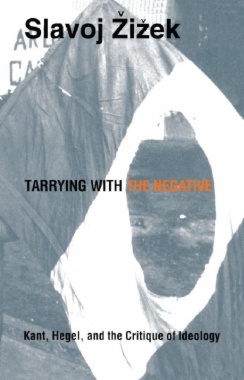In the space of barely more than five years, with the publication of four pathbreaking books, Slavoj Žižek has earned the reputation of being one of the most arresting, insightful, and scandalous thinkers in recent memory. Perhaps more than any other single author, his writings have constituted the most compelling evidence available for recognizing Jacques Lacan as the preemient philosopher of our time.
In Tarrying with the Negative, Žižek challenges the contemporary critique of ideology, and in doing so opens the way for a new understanding of social conflict, particularly the recent outbursts of nationalism and ethnic struggle. Are we, Žižek asks, confined to a postmodern universe in which truth is reduced to the contingent effect of various discursive practices and where our subjectivity is dispersed through a multitude of ideological positions? No is his answer, and the way out is a return to philosophy. This revisit to German Idealism allows Žižek to recast the critique of ideology as a tool for disclosing the dynamic of our society, a crucial aspect of which is the debate over nationalism, particularly as it has developed in the Balkans—Žižek's home. He brings the debate over nationalism into the sphere of contemporary cultural politics, breaking the impasse centered on nationalisms simultaneously fascistic and anticolonial aspirations. Provocatively, Žižek argues that what drives nationalistic and ethnic antagonism is a collectively driven refusal of our own enjoyment.
Using examples from popular culture and high theory to illuminate each other—opera, film noir, capitalist universalism, religious and ethnic fundamentalism—this work testifies to the fact that, far more radically than the postmodern sophists, Kant and Hegel are our contemporaries.
- Contents
- Introduction
- I COGITO: THE VOID CALLED SUBJECT
- 1 “I or He or It (the Thing) Which Thinks”
- The Noir Subject
- Out of Joint
- From Kant to Hegel
- The Nonequivalent Exchange
- Money and Subjectivity
- From Subject to Substance … and Back
- The Subject as “Vanishing Mediator”
- Limitation Precedes Transcendence
- “Total Recall”: Knowledge in the Real
- 2 Cogito and the Sexual Difference
- The Kantian Crack in the Universal
- The Christian Sublime, or, the “Downward-Synthesis”
- The “Formulae of Sexuation”
- “I Am Not Where I Think”
- Cogito as the Fantasy-gaze
- “Self-consciousness Is an Object”
- “I Doubt, Therefore I Am”
- The Precipitous Identification
- II ERGO: THE DIALECTICAL NONSEQUITUR
- 3 On Radical Evil and Related Matters
- “Kant with Bentham”
- Fantasy and Reality
- “A Hair of the Dog That Bit You”
- The Radical Evil
- There Are Pipes and Pipes
- The Non-intersubjective Other
- The Object of the Indefinite Judgment
- Ate and Its Beyond
- The Symbolic Beatitude
- 4 Hegel’s “Logic of Essence” as a Theory of Ideology
- The Principle of the Insufficient Ground
- Identity, Difference, Contradiction
- Form / Essence, Form / Matter, Form / Content
- Formal, Real, Complete Ground
- From “In-itself” to “For-itself”
- Ground versus Conditions
- The Tautological “Return of the Thing to Itself”
- The “Absolute Unrest of Becoming”
- Actuality of the Possible
- III SUM: THE LOOP OF ENJOYMENT
- 5 “The Wound Is Healed Only by the Spear That Smote You”
- The Answer of the Real
- Subjectivity and Grace
- From Mozart to Wagner
- “I Am Going to Talk to You about the Lamella”
- The Wagnerian Performative
- Beyond the Phallus
- Safe-keeping God’s Jouissance
- The Perverse Loop
- 6 Enjoy Your Nation as Yourself!
- The “Theft of Enjoyment”
- Capitalism without Capitalism
- The Blind Spot of Liberalism
- Spinozism, or, the Ideology of Late Capitalism
- Dreams of Nationalism, Explained by the Dream of Radical Evil
- The Eastern European “Vanishing Mediators”
- Collapse of the “Big Other”
- Notes
- Index

